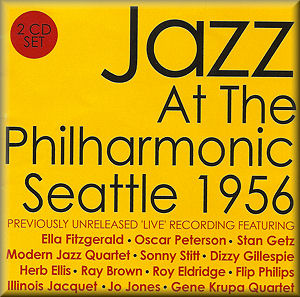CD1
1. Spoken introduction
Swing Set Septet
2. Up Tempo Blues
3. These Foolish Things
4. I Can't Get Started
5. Moonglow
6. Noisy Norman Blues
Roy Eldridge - Trumpet
Flip Phillips, Illinois Jacquet - Tenor saxes
Oscar Peterson - Piano
Herb Ellis - Guitar
Ray Brown - Bass
Jo Jones - Drums
7. Spoken introduction
Modern Jazz Quartet
8. D and E Blues
9. Bess, Oh Where's My Bess
10. Django
11. Bluesology
John Lewis - Piano
Milt Jackson - Vibes
Percy Heath - Bass
Connie Kay - Drums
12. Spoken introduction
MJQ Augmented
13. Groovin' High
14. The Nearness Of You
15. Round Midnight
16. We'll Be Together Again
17. Shaw 'Nuff
MJQ with:
Sonny Stitt - Alto sax
Stan Getz - Tenor sax
Dizzy Gillespie - Trumpet
John Lewis - Piano
Percy Heath - Bass
Connie Kay - Drums
CD2
1. Spoken introduction
Gene Krupa Quartet
2. Bernie's Tune
3. My One and Only Love
4. Drum Boogie
5. Drum Boogie pt.2
Gene Krupa - Drums
Eddie Shu - Tenor sax, alto sax, trumpet
Dave McKenna - Piano
John Drew- Bass
Oscar Peterson Trio
6. How About You?
7. Will You Still Be Mine?
8. Title Unknown
Oscar Peterson - Piano
Herb Ellis - Guitar
Ray Brown - Bass
Ella Fitzgerald with the Oscar Peterson Trio
9. Just One Of Those Things
10. Do Nothing Till You Hear From Me
11. Solitude
12. Roll 'Em Pete
13. Easy To Love
14. Air Mail Special
15. Spoken introduction
16. Finale
As above plus Ella Fitzgerald - Vocals
Bill Carter, a jazz fan from San Francisco, heard that there was a container of recorded tapes at a rubbish dump in San Rafael. He salvaged numerous tapes, including a recording of a 1956 concert in Seattle. It was one of Norman Granz's legendary "Jazz at the Philharmonic" concerts, which assembled all-star programmes featuring some of the biggest names in jazz.
We may forget that, in many cases, Norman Granz had made these musicians into stars. This was certainly the case with Flip Phillips and Oscar Peterson and - to a certain extent - with Ella Fitzgerald, whose career was reinvigorated by Granz. Norman has also been accused of encouraging battles between such players as Phillips and Jacquet or Gillespie and Eldridge but Granz can hardly be blamed for the natural tendency for jazz musicians to play competitively in the style of the old "cutting contests".
The result is this mouth-watering double CD, with a line-up of some of Norman Granz's (and my) favourite artists. After his introduction to the artists, the first session bursts into swing thanks to the Oscar Peterson Trio, which ably accompanies Flip Phillips, Roy Eldridge and Illinois Jacquet. Jo Jones helps the swing along, although the overpowering sizzling sound of his cymbal is a distraction which may make you feel that a kettle is boiling vigorously. If the recordings had been remastered, this would have been a suitable aspect to render less obtrusive.
Norman Granz knew how to pace a performance, and the septet session bookends a ballad medley by the three horn players with two lively blues, the second of which features a long drum solo by Jo Jones, who introduces several of his customary tricks. It is notable that the following set by the Modern Jazz Quartet also opens and closes with a blues. The MJQ provides a useful change of pace, with its generally subdued playing. The highlight is Django, one of the MJQ's greatest inventions. This reminds us of the vital role played by sturdy bassist Percy Heath, who is the equivalent in this group of Ray Brown in the Septet session.
The MJQ's rhythm section stays on to accompany Sonny Stitt, Stan Getz and Dizzy Gillespie in another set which opens and closes with wild up-tempo numbers, surrounding ballad performances by Sonny, Stan and Dizzy. There is a natural bonhomie amongst the musicians, as Stitt, Lewis and Heath all played in Dizzy Gillespie's big band. Connie Kay's drums are remarkably powerful: a surprise from someone whose drumming with the MJQ has been accused of being effete.
The second CD opens with a set by the Gene Krupa Quartet, which is rather underpowered to start with, except for some fireworks from Eddie Shu on the alto sax in My One and Only Love. Gene Krupa is barely audible in the first two tracks but he is the man the audience really wants to hear, and he eventually comes into his own with a thrilling drum solo in the two parts of Drum Boogie, separated by a mysterious fade out and fade in again.
The neglected Will You Still Be Mine is a high spot of the Oscar Peterson Trio's three numbers, although one feels the need for an Ed Thigpen drum break to introduce each musician's solo. Finally Ella Fitzgerald joins the trio, displaying her supremacy at fast and slow tempos and even managing to play some short snatches on the harmonica. Norman Granz's unsurpassed ability as a talent scout is reinforced by his determination to become manager of Ella as well as Oscar Peterson: two artists supreme in their fields.
The sound quality tends to be variable and this might have been corrected by some judicious remastering. But this is a typically stimulating Granz session. Let's hope for some more reissued Acrobat albums from the same source.
Tony Augarde
www.augardebooks.co.uk
